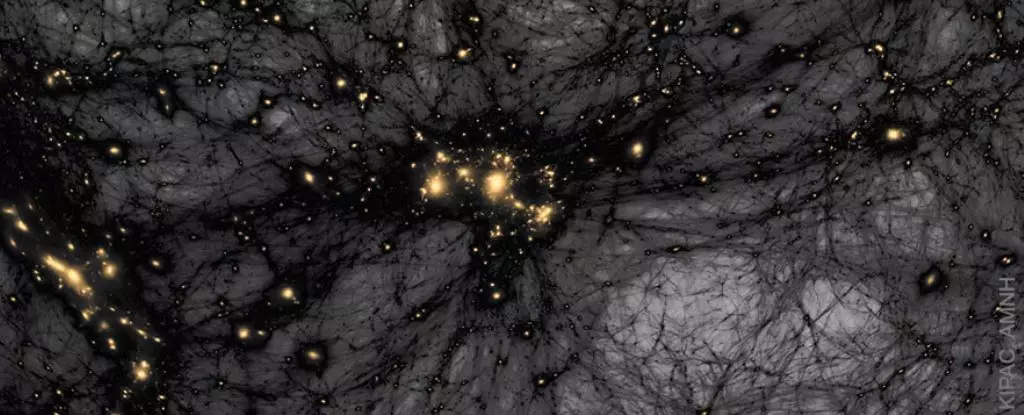In the realm of cosmology, the standard model has long stood as a beacon of scientific consensus, highlighting the Universe’s ongoing expansion. However, lurking beneath this veneer of clarity is the perplexing Hubble tension—a discrepancy between measurements of the Universe’s rate of expansion at different cosmic epochs. Observations from nearby galaxies suggest a faster expansion rate compared to the slower pace inferred from the early Universe. This inconsistency has left researchers scratching their heads, searching for answers in the fabric of the cosmos.
The fascinating aspect of the Hubble tension is not merely the tension itself but the myriad of hypotheses it has sparked. Some scientists have pondered the validity of Einstein’s general relativity, while others have proposed radical ideas, such as the potential non-existence of dark matter. Others wonder about the uniformity of time across the cosmos. Yet, a recent proposal takes an intriguing twist: what if dark matter itself evolves over time?
Challenging Established Notions
The concept of evolving dark matter is not just a tantalizing idea; it positions itself at an exciting intersection of pressing cosmological questions. To date, most discussions around dark matter have involved a largely static view of its nature. Indeed, we hail its existence based on indirect observations, such as gravitational effects on visible matter, cosmic microwave background radiation, and galaxy rotation curves. The absence of direct detection has led to skepticism, primarily among those who favor modified theories of gravity that seek to eliminate dark matter instead of adapting its properties.
This resistance to the evolving dark matter theory stems from an established belief in the unchanging nature of dark matter. However, the recent propositions put forth by researchers examining both dark energy and dark matter’s roles highlight a daring perspective that reshapes our understanding. The authors contend that by attributing an evolving nature to dark matter, we can reconcile the glaring inconsistencies in cosmological observations more effectively.
The Evolution of Concepts: From Dark Energy to Dark Matter
The correlation between dark energy and dark matter is critical to understanding cosmic evolution. The energy density and matter density serve as crucial parameters determining the dynamic universe. Such a relationship allows theories centered around evolving dark energy and evolving dark matter to overlap, suggesting that our cosmic narrative may be more intricate than previously envisaged.
This perspective is particularly ambitious as it opens doors to the notion of exotic dark matter—dark matter that doesn’t remain static but changes its behavior over time. The premise of variable equations of state for dark matter, akin to the way neutrinos oscillate, provides an appealing blueprint that invites further exploration. Oscillatory behavior within cold dark matter could serve as a key mechanism for addressing Hubble tension while maintaining agreement with existing dark matter observations.
Decoding the Cosmic Puzzle
The authors of this innovative study delve into potential configurations of dark matter, proposing that a mixture of approximately 15% oscillatory cold dark matter and 85% regular dark matter might offer the best fit for observational data. This intriguing ratio itself is a minor revolution in thought, suggesting that our understanding of dark matter’s composition may require a major revision rather than a simple enhancement.
Although they acknowledge their model’s simplicity and the speculative nature of evolving dark matter, this work shines a spotlight on the necessity for researchers to embrace broader conceptualizations. The limitations posed by traditional dark matter theories could choke the growth of cosmological understanding, whereas evolving dark matter could illuminate our path to resolving enigmas like the Hubble tension.
It is clear that the consideration of evolving dark matter may be more than just a novel thought experiment; it holds the potential to catalyze a renaissance in how we comprehend the Universe. As the scientific community continues to sift through vast amounts of astronomical data, evolving dark matter deserves serious contemplation. The cosmos may not be as static as it appears, and embracing change could be fundamental to unraveling its deepest mysteries.

